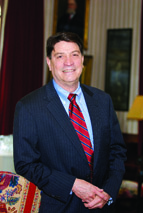Stancel Riley Jr.
By Tara Hulen |
| Stancel Riley Jr., executive director of the Massachusetts Board of Registration in Medicine. Photo by Lisa Cohen. |
As a sickly, asthmatic child in Concord, Ala., Stancel M. Riley Jr., M.D., never imagined he would make medical history. Today, however, the 1972 School of Medicine alumnus serves as executive director of the Massachusetts Board of Registration in Medicine—the first physician to head the agency that licenses and regulates more than 38,000 physicians and acupuncturists. He’s also a board-certified cardiothoracic surgeon who performed the first open heart surgery in Huntsville, Ala.—a bypass—in 1981.
Fortunate timing has helped him throughout his career, Riley says. He enrolled in the School of Medicine in 1968, two years after renowned heart surgeon John W. Kirklin came to the Birmingham medical center. It was a golden age for a wannabe cardiac surgeon, Riley explains, with Robert Karp, Nicholas Kouchoukos, and Albert Pacifico on Kirklin’s team. Though Riley had planned to become a pediatrician, working nights in the intensive-care unit changed his mind. “I saw babies when they were blue, before they were operated on, and when they came back from the operating room and were pink,” he recalls. “I wanted to make that happen.”
By the Book
After two rotations at Massachusetts General Hospital and a post as a senior registrar in thoracic surgery at Guy’s Hospital in London, Riley joined colleagues planning a cardiac surgery program in Huntsville. There he broke new ground by using the methods listed in Kirklin’s famous and often duplicated “Blue Book,” a detailed, systematic approach for the operating room that calls for even the most experienced surgeons to follow checklists for every procedure. “It is exactly what everybody is talking about right now,” Riley says. “It’s a standardized way of treating cardiac disease.”
After 22 years, Riley had to leave the OR when a cervical spine injury caused numbness in his fingers. But experience outside the OR helped him forge a new career path in medical leadership. Over the years, Riley had served as president of the American Heart Association Alabama chapter and was on the Blue Cross and Blue Shield of Alabama board of directors and medical review committee. He also served on the American Red Cross board of directors.
Soon after leaving his practice, Riley received an American Association of Thoracic Surgery scholarship to the John F. Kennedy School of Government at Harvard University, where he obtained a Master in Public Administration in 2004. He went on to receive a Master in Public Health from Harvard’s School of Public Health in 2005.
Much like his UAB experience, his timing at Harvard “was really serendipitous,” Riley says. There he worked with Lucian Leape, known as the father of patient safety. That relationship connected Riley with the Massachusetts Board of Registration in Medicine, where he became director of a patient safety division in 2006. He was named executive director in 2009.
A Physician’s Insight
Beyond its role as a regulatory body, the board focuses on patient safety and quality of care, says Riley, who brings a physician’s insight to a group that once consisted of mostly lawyers. A key goal is to get hospitals and surgeons to accept Kirklin-style standardization methods and checklists. “We’re making sure that we provide adequate education for physicians. As part of that, patient quality of care and safety will get better for everybody,” Riley explains.
One of his first tasks as executive director was to create a strategic plan. “We must have a direction and know where we want to go,” he says. “That kind of organization comes from John Kirklin. He was one of the most organized human beings I’ve been around in my entire life.”
Riley also teaches a class at Harvard University Medical School on how to deliver bad news to patients. Just being at Harvard continues to amaze the former kid from Concord. “I’ve been incredibly lucky,” he says. “This is better than I’ve ever dreamed.”